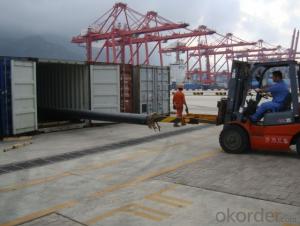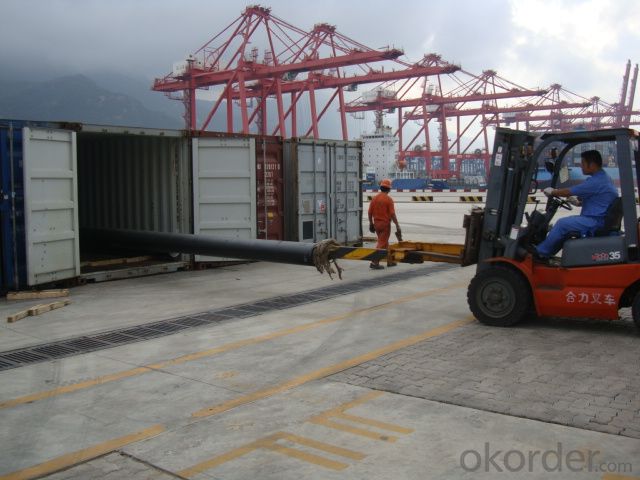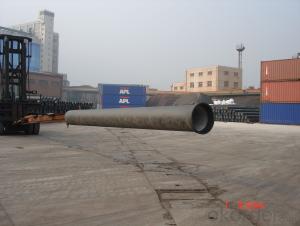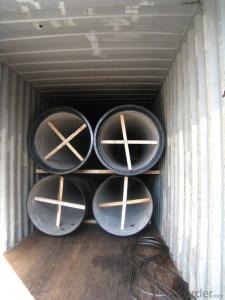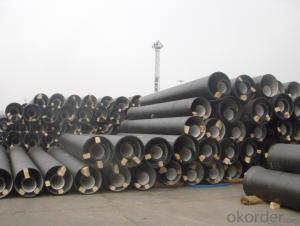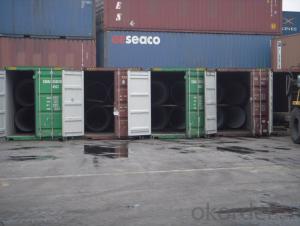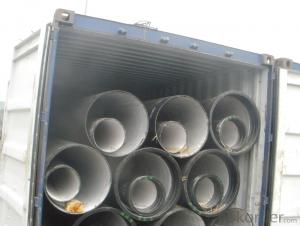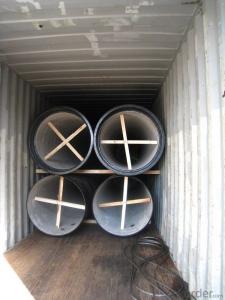DUCTILE IRON PIPE AND PIPE FITTINGS C CLASS DN1800
- Loading Port:
- Tianjin
- Payment Terms:
- TT OR LC
- Min Order Qty:
- 23 pc
- Supply Capability:
- 3000 pc/month
OKorder Service Pledge
OKorder Financial Service
You Might Also Like
· Material : Ductile Cast Iron
· Size Range : DN 80mm to DN 2000mm
· Unit Effective Length : 6m or 5.7m
· Manufacture Standard: ISO 2531:1998/ EN 545:2006/EN 598:2007
· Annual capacity : 200,000 tons
· Coating Exterior: Zinc 130g/m2 according to ISO 8179-1 and bitumen coating 70 microns.
· Cement Interior: Portland Cement/ High Alumina Cement/ Sulphate Resisting Cement Lining according to ISO 4179
· Special requirements on external coating and internal lining can be applied
· We also provide accessories such as SBR/EPDM rubber gaskets, lubricant paste, pipe caps, PE sleeves, etc.
Additional Parts:
Each pipe is strictly inspected according to related standard to ensure permanently high performance.
Easy Installation at site and service free for life
Long Service Lifespan
Quotation will arrive you within 24hours once we get your inquiry.
We guarantee offering you a competitive price.
A copy of original inspection reports of pipes will be offered after shipment.
Photos of loading process will be sent to the customer after shipment effect.
We will follow-up the delivery progress after shipment effect and update to the customer on weekly basis.
- Q: What are the different types of coatings available for ductile iron pipe?
- Ductile iron pipe offers a range of coating options, each with its own unique properties and benefits. 1. One commonly used coating is cement mortar. It involves applying a layer of cement mortar to both the interior and exterior surfaces of the pipe. This coating protects against corrosion and abrasion, while also improving hydraulic efficiency. 2. Another popular choice is polyethylene encasement. This involves wrapping the pipe with a layer of polyethylene material. It provides excellent corrosion resistance, especially against soil and water contaminants. 3. Fusion-bonded epoxy (FBE) coating is applied by heating epoxy powder to create a strong bond with the pipe surface. It offers outstanding corrosion resistance and is commonly used in aggressive environments like wastewater treatment plants and chemical processing facilities. 4. Zinc coating, also known as galvanization, is applied by adding a layer of zinc to the pipe's surface. It provides excellent corrosion resistance and is often used in outdoor applications exposed to moisture and humidity. 5. Bituminous coating is a black, tar-like substance that protects against corrosion. It is commonly used in underground applications where the pipe is in contact with soil or water. 6. Polyurethane coatings are known for their resistance to abrasion, impact, and chemical corrosion. They are often used in aggressive environments such as oil and gas pipelines. These examples highlight the different coatings available for ductile iron pipe. The choice of coating depends on factors like the intended application, environmental conditions, and desired level of corrosion protection. It is crucial to consult industry experts and follow relevant standards and specifications when selecting a coating for ductile iron pipe.
- Q: Ductile cast iron can replace copper sleeve
- Although the ductile cast iron with lubrication, but no lubrication or copper sleeve, Rongchang graphite copper sleeve, with self lubrication with high strength copper alloy (CuZn25Al5, CuZn24Al6Fe3Mn4) as the basic material, according to the use conditions according to a certain proportion in the work surface processing hole and fill in the solid lubricant, high strength copper alloy provide a high bearing capacity and solid lubricant can form low friction.
- Q: How do ductile iron pipes perform in cold weather conditions?
- The exceptional performance of ductile iron pipes in cold weather conditions is well-known. Unlike cast iron or PVC, ductile iron exhibits remarkable resistance to low temperatures. This resistance is primarily attributed to its unique microstructure, which enables it to maintain its structural integrity even in extreme weather conditions. In freezing temperatures, ductile iron pipes demonstrate a low coefficient of thermal expansion, meaning they do not contract or expand significantly with changes in temperature. This characteristic ensures their stability and prevents cracking or bursting. Additionally, the high impact resistance of ductile iron further enhances its ability to withstand the stress imposed by cold weather conditions. Moreover, ductile iron pipes are equipped with a protective lining, typically composed of cement mortar or epoxy. This lining acts as an additional barrier against the effects of cold weather, preventing the formation of ice on the inner surface of the pipes. Consequently, the risk of blockages or reduced flow capacity is greatly reduced. In conclusion, ductile iron pipes are a reliable choice for cold weather conditions. Their durability, low thermal expansion, and protective lining make them highly resistant to the challenges posed by freezing temperatures. Whether used for water supply, sewer systems, or other applications, ductile iron pipes have consistently proven their effectiveness even in the harshest winter climates.
- Q: What is the weight of ductile iron pipes compared to other materials?
- Ductile iron pipes are generally heavier compared to other materials commonly used in the construction industry. The weight of ductile iron pipes can vary depending on the specific size and dimensions, but they are typically heavier than materials such as PVC, HDPE, and steel pipes. This increased weight is primarily due to the dense nature of ductile iron, which provides durability, strength, and resistance to corrosion. However, the weight of ductile iron pipes also contributes to the challenges associated with transportation, installation, and handling, requiring appropriate equipment and techniques to ensure safe and efficient installation. Overall, while ductile iron pipes may be heavier than other materials, they offer numerous advantages in terms of longevity and performance in various applications.
- Q: How much water seepage is allowed in the water pressure test for water hose DN300?
- Test method: metal composite pipe and water pipe system 10min observed in the test pressure, the pressure drop should be no more than 0.02MPa, and then reduced to working pressure check should be no leakage of plastic pipe; water supply system should be in the test pressure regulator 1H, pressure drop shall not exceed 0.05MPa, then stabilized at 1.15 times the working pressure of the state under 2h, the pressure drop shall not exceed 0.03MPa, and check each connection must not leak.
- Q: Are ductile iron pipes suitable for use in irrigation sprinkler systems?
- Yes, ductile iron pipes are suitable for use in irrigation sprinkler systems. Ductile iron pipes are known for their durability, strength, and corrosion resistance, making them an ideal choice for various applications, including irrigation systems. These pipes have a high tensile strength and can withstand high pressure and heavy loads, which is essential for maintaining a consistent water supply to sprinkler systems. Additionally, ductile iron pipes have a long lifespan, reducing the need for frequent maintenance and replacement, making them a cost-effective option for irrigation systems. Overall, ductile iron pipes are a reliable and suitable choice for use in irrigation sprinkler systems.
- Q: Can ductile iron pipes be used for underground slurry pipelines?
- Underground slurry pipelines can utilize ductile iron pipes, as they possess strength, durability, and resistance to corrosion, making them suitable for various applications. Their qualities make them reliable and cost-effective in transporting mixtures of solids and liquids over long distances. Ductile iron pipes can endure the abrasive nature of slurry and the external loads associated with underground installation, owing to their inherent toughness and flexibility. Moreover, they can be easily connected through different methods, ensuring a secure and leak-free pipeline system. Nonetheless, it is crucial to assess the specific properties of the slurry being transported and seek professional advice to determine the suitable pipe specifications and design considerations for the underground slurry pipeline.
- Q: Are ductile iron pipes suitable for tunneling projects?
- Ductile iron pipes are well-suited for tunneling projects due to their strength, durability, and flexibility. With their ability to endure high pressure and heavy loads, they are an excellent choice for underground tunnels. These pipes are also highly resistant to corrosion, which is vital in moist and chemical-laden underground environments. Furthermore, their installation and maintenance are relatively simple, making them a cost-effective option for tunneling endeavors. In summary, ductile iron pipes possess the essential characteristics needed for tunneling projects, making them a fitting selection for these applications.
- Q: Which is good for water polo cast iron pipe steel pipe?
- Flexible seamless steel pipe is good toughness, good processing, better than ductile iron corrosion resistance, the price is slightly higher;
- Q: Can ductile iron pipe be used for stormwater management systems?
- Ductile iron pipe is indeed suitable for stormwater management systems. It finds extensive use in diverse applications, such as stormwater drainage systems. Its exceptional attributes encompass robustness, longevity, and resistance against corrosion, rendering it highly capable of enduring the challenging conditions inherent in stormwater management. Furthermore, the installation and maintenance of ductile iron pipe are effortless, thus making it a cost-efficient selection for stormwater management systems. In summary, ductile iron pipe emerges as a dependable and fitting alternative for the construction of stormwater management systems.
Send your message to us
DUCTILE IRON PIPE AND PIPE FITTINGS C CLASS DN1800
- Loading Port:
- Tianjin
- Payment Terms:
- TT OR LC
- Min Order Qty:
- 23 pc
- Supply Capability:
- 3000 pc/month
OKorder Service Pledge
OKorder Financial Service
Similar products
Hot products
Hot Searches
Related keywords
